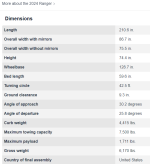K9LTW
Active member
Hmm... I learned something today! Apparently the reasoning for lower octane at high altitude came from a 1942 study, while a 1987 study (still far from recent!) concluded that the octane need for modern (1987) engines dropped by only ~0.2 points per 1,000 ft, so at 5,000 ft 85 octane is about like 86 octane at sea level.
Oddly, the great majority of internet sites show no references, but are parroting the conclusions of a 1942 study!... ie, "low octane at altitude is fine"
This doesn't mean that 85 octane will hurt your engine, but efficiency and power will be reduced due to timing retard. Turbo engines are more greatly effected as well.
I've pretty much always used 85 octane in my truck, and never heard a hint of knock, so if it's correcting it's very quick. I also get better MPG at altitude, but that's surely due to lower air resistance.
Interesting...and, sadly, not all that surprising. Though having combed through countless scientific studies related to both performance nutrition (I mean...fuel for the body, so related...ish), and strength/hypertrophy a lot of advice that still stands today is based on old studies that don't hold water currently. Good find.
It's infuriating that the cost of gas has increased disproportionately and fluctuates unevenly as well. Diesel should be cheapest...it's been more than premium until fairly recently around here. It used to be 10 cents difference between regular, mid, and premium each. Suddenly that exploded with premium being 50 cents to a dollar more a gallon not too many (relatively speaking) years ago and will never go back. And, no...this isn't a political post, so don't let it devolve into one. Now manufacturers are increasing recommended octanes more often than not from what I've seen. Though with what seems like higher compression/lower displacement engines and more and more forced induction, it's not a surprise.







